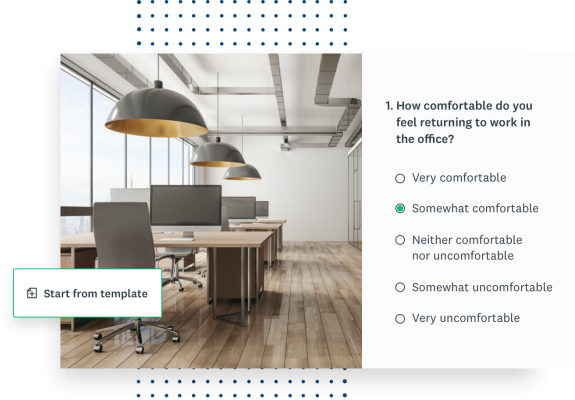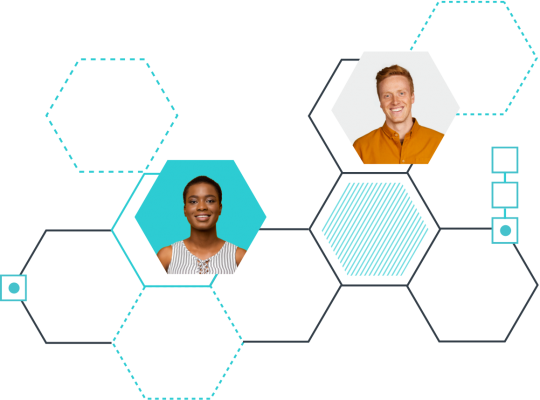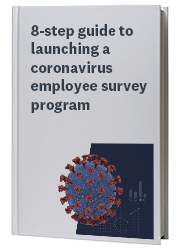SurveyMonkey’s resources for the coronavirus crisis
Go to: TEMPLATES | SOLUTIONS | DISCOUNTS | CONTRIBUTE
TEMPLATES
Check in with the people you serve with new survey templates
Large portions of the workforce are working remotely, facing childcare needs and struggling with anxieties about their health, their families and the economy. School systems face unique logistical challenges as they attempt to implement distance learning programmes for students with variable needs and access to resources.
Now more than ever, it’s important for organisations to listen to the people they serve and find ways to help them cope with the new challenges they’re facing. That’s why we built new survey templates that are designed to help companies of all sizes communicate with their employees at scale.

Coronavirus leadership check-in
This template is designed for executive leadership teams to keep a pulse on employees’ wellbeing and ensure that they have the support to work remotely.

Working from home check-in
This template is designed to be sent regularly by managers to assess whether employees who are working remotely have the proper support.

K-12 distance learning
This template is designed to help K-12 school administrators understand how to best serve students and parents in a distance learning environment.

B2B customer pulse survey template
This template is designed to help you understand how your B2B customers are engaging with your products or services during this time.
Coronavirus returning to work check-in
This template is designed to understand employees’ concerns about returning to the workplace and what would make them more comfortable coming back.

Need a different type of survey? See our full list of survey templates.
Get step-by-step instructions
for launching our employee survey templates so you can start checking in with your team as soon as possible.
SOLUTIONS
Get feedback resources and professional support
Build a survey programme to address the coronavirus crisis at your organisation with help from expert survey methodologists. Work with experts to build surveys tailored to your needs and analyse the results to ensure that you’re taking the right actions.
Available resources include:
- Remote work check-ins
- Returning to work
- Monitor community wellness
- Healthcare workforce check-ins
- Health and safety check-ins for frontline workers

Should you send surveys during the coronavirus crisis?
Fundamentally, surveys are about remotely communicating with people at scale. That makes them an important tool for gathering opinions and feedback at a time when social distancing is the norm.

See how feedback from surveys helps during the crisis
SurveyMonkey customers are using surveys to do everything from patient symptom tracking to checking in on employees’ mental health, to assessing local community needs.

DISCOUNTS
We know it’s never been more crucial for you to hear from the people you serve
Everyone wants to understand how people are coping with the current situation. As we develop more tools and templates to help customers manage this crisis, we’re offering deep discounts to some of the groups who are most affected by the coronavirus crisis: those in education, charities and nonprofits.*
For educators and students in the US and UK
Educators and students are eligible to receive up to 80% off Standard Monthly plans. Follow these steps to access your discount:
- Log in to your account, if you have one. If not, no worries – just head to the next step.
- Go to the Plans & Pricing page.
- Scroll to the bottom of the page and review the reduced pricing options section.
- Click the link about reduced pricing for students or educators.
- Upgrade to the plan of your choice from the Reduced Pricing for Students & Educators page.
If you don't see the reduced pricing options section for students or educators, it means you're not eligible because of your location or because you currently have an existing paid account.
*All discounts are granted at SurveyMonkey’s sole discretion for one-year periods. SurveyMonkey may decline to renew a discount at its sole discretion. The discounts we have available differ depending on the country you're located in.
CONTRIBUTE
Discover more resources

Attract, engage and retain top talent with data-driven insights
Create HR surveys with SurveyMonkey to gather feedback, boost engagement and improve workplace culture. Streamline HR processes with customisable templates.

What is employee Net Promoter Score?
Discover how HR professionals use the employee Net Promoter Score (eNPS) to uncover employee sentiment for reducing turnover and creating an engaging workplace environment.

Help employees thrive with learning programmes that drive real growth
Measure L&D impact with powerful survey software. Gather feedback, track growth and improve employee development with insights that support long-term success.

Inclusion and Belonging Survey Software
Foster a more inclusive workplace with survey software. Measure belonging, gather honest feedback and build a culture where every voice matters.
Help those who are helping others
Take a survey to raise $0.50 for organisations such as the American Red Cross, Doctors Without Borders and more.
